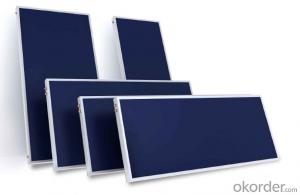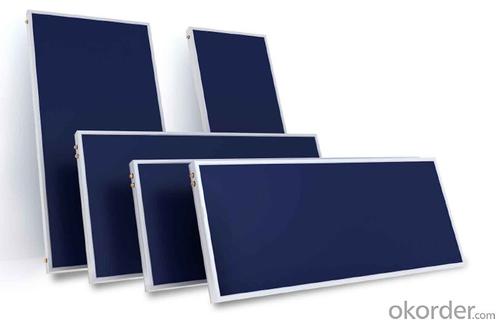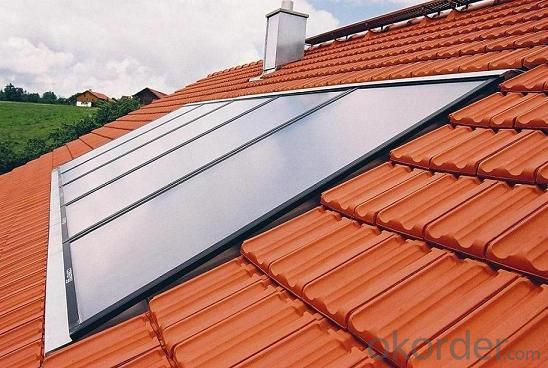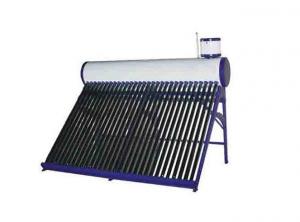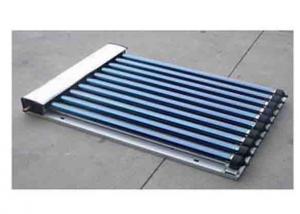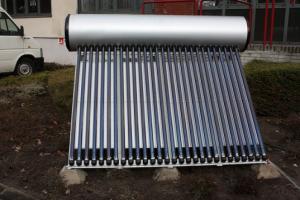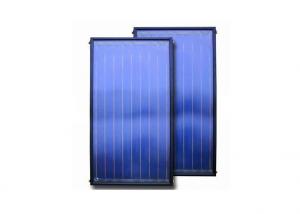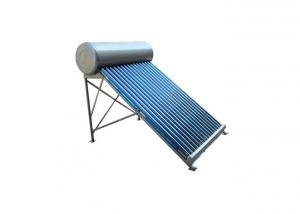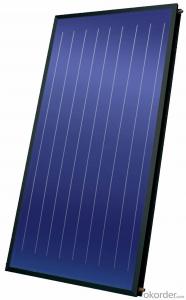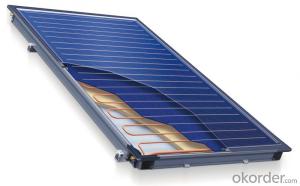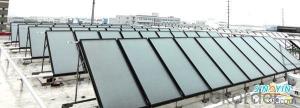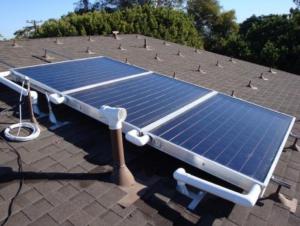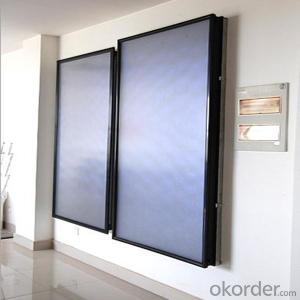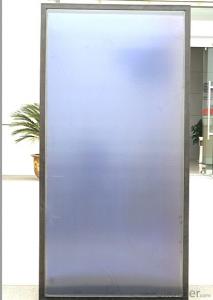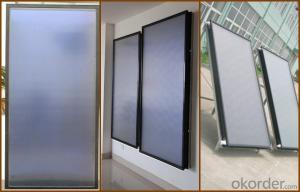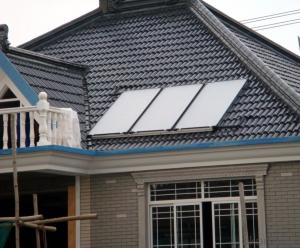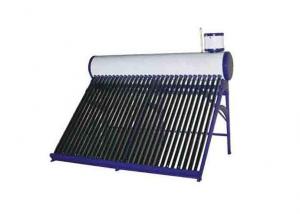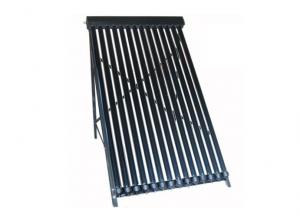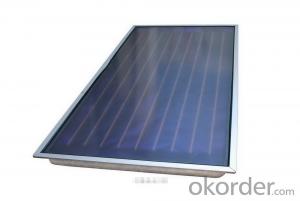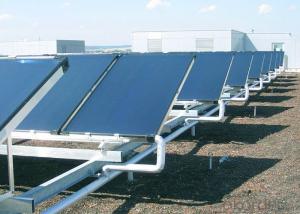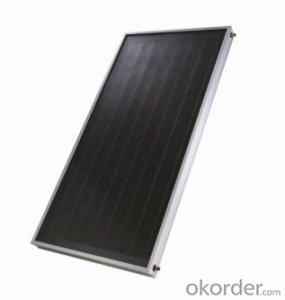Tenkiv Solar Collectors - Flat Plate Solar Collector for Water Heater
- Loading Port:
- Tianjin
- Payment Terms:
- TT OR LC
- Min Order Qty:
- 1 kg
- Supply Capability:
- 50 kg/month
OKorder Service Pledge
OKorder Financial Service
You Might Also Like
1. Structure of Flat Plate Solar Collector For Water Heater
Flat plate solar collector is one of the most basic types of solar collectors, and the structure of this product is shown as following picture. The simple structure, reliable operation, approriate cost and great ability for pressure with large surface for heat absorption make it one of the best choice for the combination of solar energy and the architecture. This flat plate solar collector is designed for water heater.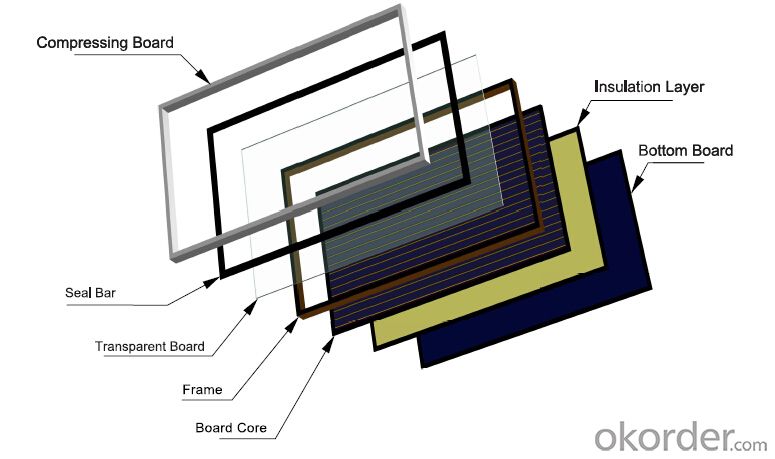
2. Main Features of Flat Plate Solar Collector For Water Heater
Laser welded panel with blue tint film increases the
efficiency of heat accumulation and heat transmission.Ultra white low iron content tempered glass achieves
high transparency.Dull polish silver board color
3. Flat Plate Solar Collector For Water Heater Images
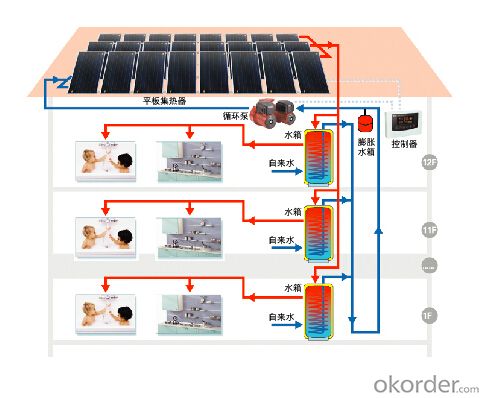
4. Flat Plate Solar Collector For Water Heater Specification
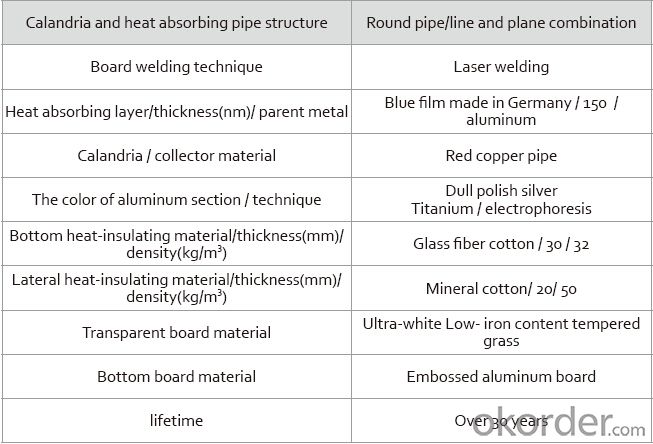
5. FAQ
(1) Q:Compared to the vacuum tube solar system, what is the advantage of flat plate solar collector system?
Re: In the condition of the same area, the flat plate solar collector system of high efficiency can provide more hot water.
(2)Q: Can you offer samples?
Re: It seems a little difficult for the moment, but if you are interested, you are welcom to have a visit in our factory.
- Q: Are there any limitations to the size of a solar collector installation?
- Yes, there are limitations to the size of a solar collector installation. Some of the key limitations include the availability of suitable space, the capacity of the electrical grid to handle the generated energy, and the cost and efficiency of the system. Additionally, local zoning regulations and building codes may impose restrictions on the size and placement of solar collector installations.
- Q: Can solar collectors be used for heating asphalt in road construction?
- Yes, solar collectors can be used for heating asphalt in road construction. Solar thermal collectors are designed to capture sunlight and convert it into heat energy. This heat energy can then be used for various applications, including heating asphalt. By using solar collectors, road construction companies can reduce their reliance on traditional heating methods such as propane or natural gas burners, which can be costly and produce greenhouse gas emissions. Solar collectors work by absorbing sunlight and transferring the captured energy to a fluid medium, such as water or air. This heated fluid can then be used to heat asphalt during the road construction process. The heated asphalt becomes more pliable and easier to work with, improving its quality and reducing the risk of cracks and other defects in the road surface. Using solar collectors for heating asphalt in road construction offers several benefits. Firstly, it is a renewable and sustainable energy source, as sunlight is abundant and freely available. This can help reduce the environmental impact of road construction activities. Secondly, it can lead to cost savings for road construction companies, as they can reduce their reliance on fossil fuels for heating purposes. Additionally, solar collectors require minimal maintenance and have a long lifespan, making them a reliable and efficient heating solution for asphalt in road construction. However, it is important to note that the effectiveness of solar collectors for heating asphalt may vary depending on various factors, such as the location, climate, and size of the project. In areas with limited sunlight or during periods of low solar intensity, supplementary heating methods may be required. Additionally, the design and installation of solar collectors should be done by professionals to ensure optimal performance and safety. Overall, solar collectors can be a viable and environmentally-friendly option for heating asphalt in road construction, offering both economic and environmental benefits.
- Q: Are there any limitations to the angle of installation for solar collectors?
- Yes, there are limitations to the angle of installation for solar collectors. The optimal angle for solar collectors depends on the latitude of the installation location and the time of year. In general, solar collectors should be installed at an angle that maximizes the amount of sunlight they receive throughout the year. In locations closer to the equator, where the sun is higher in the sky year-round, solar collectors are typically installed at a steeper angle, usually around 30 to 40 degrees. This allows for maximum solar radiation absorption throughout the day. In areas farther from the equator, where the sun's angle changes significantly throughout the year, solar collectors are often installed at a shallower angle. This helps to optimize solar energy absorption during the winter months when the sun is lower in the sky. However, there are limitations to the angle of installation. If the angle is too steep or too shallow, it can result in reduced energy production. Steeper angles may cause snow or debris to accumulate on the solar panels, hindering their efficiency. Shallower angles may result in less solar radiation absorption, especially during the winter months. Other factors that may limit the angle of installation include space constraints, structural limitations, and aesthetic considerations. In some cases, the angle of installation may need to be adjusted to accommodate these factors, even if it is not optimal for maximum energy production. Overall, while there are limitations to the angle of installation for solar collectors, careful consideration of the location, time of year, and other factors can help ensure maximum energy production and efficiency.
- Q: Can solar collectors be used in hydrogen production?
- Yes, solar collectors can be used in hydrogen production. Solar energy can be harnessed to power electrolysis, a process that splits water molecules into hydrogen and oxygen, thus producing hydrogen gas. This method, called solar water splitting, utilizes the sun's energy to generate clean and renewable hydrogen fuel.
- Q: Are there any maintenance costs associated with solar collectors?
- Yes, there are some maintenance costs associated with solar collectors. While solar collectors are generally low-maintenance, regular cleaning of the panels may be required to ensure optimal performance. Additionally, periodic inspections and maintenance of other system components such as pumps, inverters, and batteries may be necessary.
- Q: Can solar collectors be used for radiant floor heating?
- Yes, solar collectors can be used for radiant floor heating. Solar collectors, such as solar thermal panels or evacuated tube collectors, can capture solar energy and transfer it to a fluid which can then be used to heat the floors through a radiant system. This method is an efficient and sustainable way to provide warmth to a building's floors using renewable energy sources.
- Q: How do solar collectors handle temperature fluctuations?
- Solar collectors are designed to handle temperature fluctuations by using materials and components that can withstand high temperatures. They are typically made with durable materials such as tempered glass or metal that can handle extreme heat without warping or breaking. Additionally, solar collectors often incorporate insulation to help minimize heat loss during colder temperatures. Overall, these design features enable solar collectors to effectively capture and convert sunlight into usable energy regardless of temperature fluctuations.
- Q: Are there any noise concerns with solar collectors?
- No, there are no noise concerns with solar collectors as they operate silently without any moving parts.
- Q: Can solar collectors be used for heating public transportation stations?
- Yes, solar collectors can definitely be used for heating public transportation stations. Solar collectors, also known as solar thermal systems or solar water heaters, use the sun's energy to heat water or air, which can then be used for heating purposes. Public transportation stations, such as bus stops, train platforms, or subway stations, often require heating during colder months to provide comfort to commuters waiting for their rides. Solar collectors can be installed on the roofs or walls of these stations to capture sunlight and convert it into usable heat. The collected solar energy can be used to heat water, which can then be circulated through radiators or underfloor heating systems to warm up the stations. Alternatively, the solar energy can be used to directly heat the air inside the stations, providing a comfortable environment for commuters. Using solar collectors for heating public transportation stations has several advantages. Firstly, it is a sustainable and environmentally friendly solution, as it utilizes renewable energy from the sun, reducing reliance on fossil fuels and decreasing carbon emissions. Secondly, it can help reduce energy costs for these stations, as solar energy is free once the initial installation cost is covered. Additionally, it can enhance the overall experience of commuters by providing a warm and comfortable waiting area during colder weather. However, it is important to consider certain factors when implementing solar collectors for heating public transportation stations. The size and design of the solar thermal system should be carefully planned to ensure it meets the heating demands of the station. Additionally, proper insulation and energy-efficient building design should be considered to maximize the effectiveness of the solar heating system. Regular maintenance and monitoring should also be carried out to ensure optimal performance and to address any potential issues. In conclusion, solar collectors can definitely be used for heating public transportation stations. By harnessing the power of the sun, these systems can provide a sustainable and cost-effective way to heat these stations, improving the comfort of commuters while reducing environmental impact.
- Q: Can solar collectors be used in swimming pool heating?
- Yes, solar collectors can be used in swimming pool heating. Solar collectors, such as solar panels or solar water heaters, are commonly used to harness the sun's energy and heat the water in swimming pools. These collectors absorb solar radiation and transfer the heat to the pool water, making it an energy-efficient and cost-effective method for pool heating.
Send your message to us
Tenkiv Solar Collectors - Flat Plate Solar Collector for Water Heater
- Loading Port:
- Tianjin
- Payment Terms:
- TT OR LC
- Min Order Qty:
- 1 kg
- Supply Capability:
- 50 kg/month
OKorder Service Pledge
OKorder Financial Service
Similar products
Hot products
Hot Searches
Related keywords
